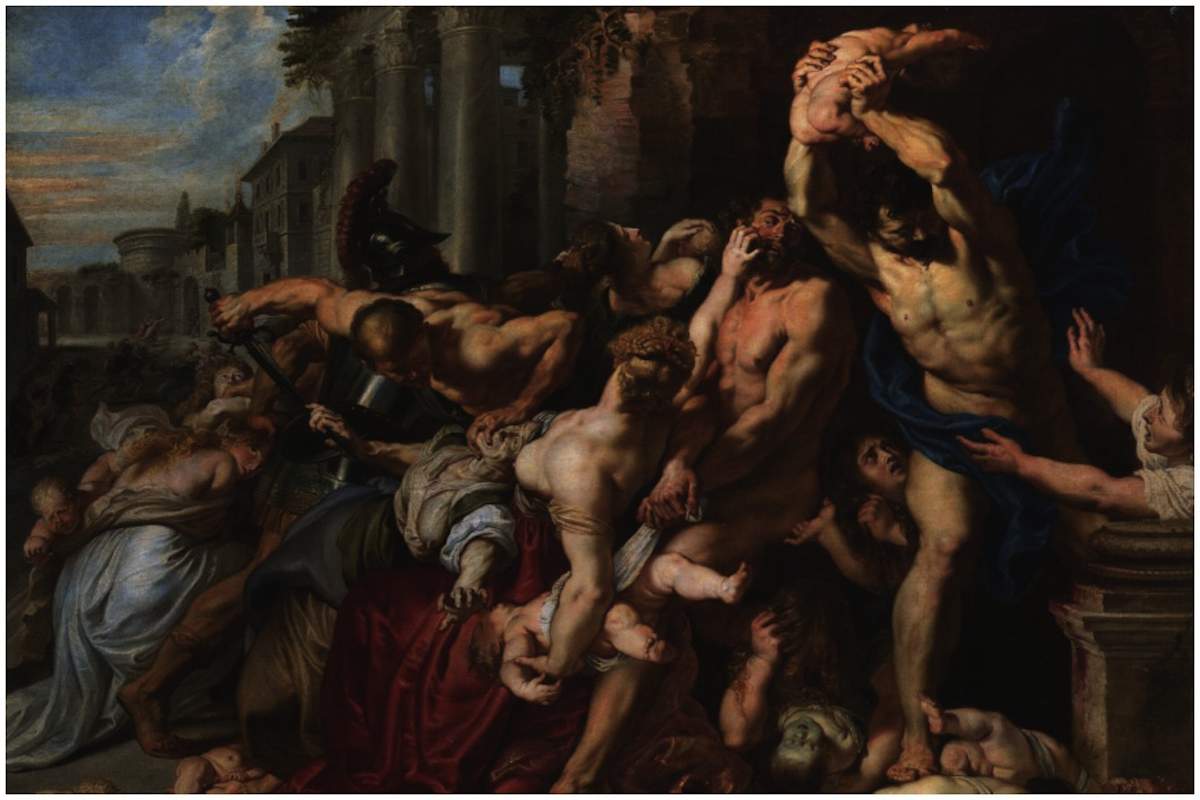Who believes what we’ve heard and seen? Who would have thought God’s saving power would look like this? (Isaiah 53:1, MSG)
Written by Steven Barto, B.S. Psych.
THE STORY OF SALVATION begins with a prophesy. One of the most profound predictions concerning Jesus is spelled out in the book of the prophet Isaiah. In fact, Isaiah means “The Lord is salvation.” Could this mighty prophet, or his book, be more appropriately titled? Isaiah 53 is essentially the gospel according to God, or “the fifth gospel.” Charles Spurgeon said, “You have the whole gospel here.” John MacArthur wrote, “Taking all the Old Testament’s messianic prophesies collectively, the side-by-side themes of suffering and glory were understandably mysterious prior to the crucifixion of Christ.” [1] Despite this prediction, even after Jesus was resurrected His disciples missed the divine truth of which the Old Testament prophets spoke.
Several of the disciples were walking and discussing what it might mean that Jesus was not in his tomb. They failed to recognize Christ when He approached them. Jesus asked what they were talking about, and the men said, “Are you the only visitor to Jerusalem who does not know the things that have happened there in these days” (Luke 24:18, RSV). When Jesus asked, “What things? the men responded, “Concerning Jesus of Nazareth, who was a prophet mighty in deed and word before God and all the people, and how our chief priests and rulers delivered him up to be condemned to death, and crucified him. But we had hoped that he was the one to redeem Israel” (24:19-21). Jesus replied, “O foolish men, and slow of heart to believe all that the prophets have spoken! Was it not necessary that the Christ should suffer these things and enter into his glory” (24:25-26).
Isaiah’s predictions concerning Christ are captivating, full of colorful description, and rich in theological meaning. Isaiah 53 contains a capsule of the basic tenets of the gospel—the sin and depravity of mankind; divine grace, justification, and atonement; wholeness and healing. Isaiah was more than a prophet; he is clearly one of the earliest evangelists we know, who succinctly reported on the coming Messiah, providing a rich explanation of the scope of the redemptive works of Christ. Isaiah provides a degree of accuracy that would normally be attributed to having been an eyewitness. To deny the precision of Isaiah’s predictions is to decide he was not given the role of a prophet.
Matthew Henry said, “No where in all the Old Testament is it so plainly and fully prophesied, that Christ ought to suffer, and then to enter into his glory, as in [the fifty-third chapter of Isaiah].” [2] In addition to coming from humble beginnings, the lowly condition Jesus submitted to (and His appearance in the world) did not match with what the Jewish religious leaders expected of their Messiah. They were anticipating a conquering political king, coming in all pomp and ceremony. They believed Christ would once again sit on the throne of David and rule all nations. By contrast, the life of Jesus was common and full of sorrow.
Eugene Peterson provides a great description of the humble beginnings of Jesus. “The servant grew up before God—a scrawny seedling, a scrubby plant in a parched field. There was nothing attractive about him, nothing to cause us to take a second look” (Isaiah 53:2, MSG). The word plant in this instance refers to a “tender” twig. Isaiah 53:1a asks, “Who hath believed our report?” The Hebrew word âman is a primitive root meaning “to build upon or support; to foster; to render (or be) firm or faithful.” This speaks of a complete assurance in something. Metaphorically, the word conveys a sense of faithfulness and trustworthiness. Frankly, there is no other means by which man can be saved except to believe that Jesus Christ is the fulfillment of Isaiah’s prophesy.
The Sanhedrin was unable to recognize Jesus as the Christ. Opinion on the streets during the time of Jesus’ ministry was that nothing good could ever come out of Nazareth (John 1:46). This man, Jesus, was the mere son of a carpenter. A laborer. Not a king. Clearly, Jesus could not have come from the Father. There were many petty rivalries between villages during the life of Jesus, but the comment in John 1:46 speaks directly to a basic rejection of Jesus as the anointed one. In the Old Testament, Moses wrote, “The LORD your God will raise up for you a prophet like me from among you, from your brethren—him you shall heed” (Deut. 18:15). Moses was the greatest prophet of ancient Israel who had received a call from God on his life to lead God’s people out of bondage and speak the very words of God. The Hebrew word for prophet (nâbîy) describes someone who is raised up by God and, accordingly, could only proclaim that which the LORD gave him to say. We was incapable of contradicting the Law or speak from his own mind. What a prophet declared had to come true, or he was a false prophet.
The Sufferings of Christ
MacArthur writes, “No text in the entire Old Testament is more momentous than Isaiah 52:13-53:12. It is a prophesy that begins and ends with the voice of Yahwey himself.” [3] God is speaking of a singular person, whom He identifies as “the righteous one, my servant” (53:11). God is speaking of the “anointed one of Israel,” the Messiah. God mentions this in Isaiah 42:1: “Behold my servant, whom I uphold, my chosen, in whom my soul delights; I have put my Spirit upon him, he will bring forth justice to the nations.” McArthur calls the passage of Scripture in Isaiah 52:13 through 53:12 “crystal-clear prophesy about the ministry, death, resurrection and coronation of the Messiah, written more than seven centuries before he came.” [4] It is what McArthur calls the gospel according to God.
To further establish that Jesus will not come as a conquering king, God said, “He will not cry or lift up his voice, or make it heard in the street; a bruised reed he will not break, and a dimly burning wick he will not quench; he will faithfully bring forth justice” (42:2-3). We read in Zechariah that God said, “Hear now, O Joshua the high priest, you and your friends who sit before you, for they are men of good omen: behold, I will bring my servant the Branch” (Zech 3:8). God clearly stated the reason for the advent of Jesus: “…I will remove the guilt of this land in a single day” (3:9b). This refers to the day on which Jesus would die to atone for the guilt of sin.
The speaker in Isaiah 52:13 through 53:12 is God—by His knowledge—announcing the future glory of the Servant. Frankly, it is impossible for a Christian who grasps the story of salvation to read this section and not immediately think of its fulfillment in Christ hundreds of years later. Isaiah did not name the Servant, nor did he call this individual “the Messiah.” Isaiah’s intention was to compare abject humility and suffering with subsequent triumph and glory. He also drew attention to the contrast between the attitudes which would be shown toward the Servant before and after his glorification. Ultimately, the Servant would be accorded the highest majesty. His sufferings would give way to glory, which would cause kings and rulers of the time to be dumbfounded. This is crucial to understanding the Servant’s mission, for it was customary during the early centuries to scorn or despise those who were suffering. The Jews saw this as a sign that the individual had fallen out of grace.
Isaiah clearly explained that the Servant’s sufferings were not because of his own grievous sins, as everyone would have concluded, but were suffered exclusively and completely on the behalf of others—for my people (53:8). Isaiah wrote, “Yet it was the will of the LORD to bruise him; he has put him to grief; when he makes himself an offering for sin, he shall see his offspring, he shall prolong his days; the will of the LORD shall prosper in his hand” (53:10) (italics mine). The very nature of illness changes in verse 7. It is worth noting that Isaiah’s intent was not to portray the Servant as a patient and resigned sick man, merely stoical in his suffering; rather, he was someone who quite deliberately chose not to defend himself from false accusations, condemnation, and execution. He silently accepted his role in providing redemption for others by suffering and dying as a proxy for those who were truly guilty.
I find it fascinating that the Book of Isaiah is divided into two sections: the first containing thirty-nine chapters and the second twenty-seven chapters. The Bible is also divided into two distinct sections: the thirty-nine books of the Old Testament and the twenty-seven books of the New Testament. The second division of Isaiah begins exactly where the New Testament begins and where it ends. It opens with the ministry of John the Baptist (Isa. 40:3-5). It concludes with the new heavens and the new earth (Isa. 65:17; 66:22). Ultimately, as Isaiah wrote, “From new moon to new moon, and from sabbath to sabbath, all flesh shall come to worship before me, says the LORD” (66:23). Most believers relate easily to Isaiah 53, but are not familiar with the extent to which this prophet of the Old Testament foreshadowed the Father’s plan for salvation and the redemptive works of Christ. Isaiah categorized his explanations in a pattern that mirrors the Bible and its division between the the Old and the New Covenants.
The Relevant Passage Intact
Most Christians understand that biblical scribes and scholars added the delineation of chapters and verses to the Bible in order to make it easier to perform systematic theological and exegetical study. This format is also more convenient for sharing relevant portions of Scripture, and when reading, teaching, or studying the Bible. The following represents how Isaiah 52:13 through 53:12 would have appeared as originally penned:
Behold, my servant shall prosper, he shall be exalted and lifted up, and shall be very high. As many were astonished at him–his appearance was so marred, beyond human semblance, and his form beyond that of the sons of men—so shall he startle many nations; kings shall shut their mouths because of him; for that which has not been told them they shall see, and that which they have not heard they shall understand. Who has believed what we have heard? And to whom has the arm of the LORD been revealed? For he grew up before him like a young plant, and like a root out of dry ground; he had no form or comeliness that we should look at him, and no beauty that we should desire him. He was despised and rejected by men; a man of sorrows, and acquainted with grief; and as one from whom men hide their faces he was despised, and we esteemed him not. Surely he has borne our griefs and carried our sorrows; yet we esteemed him stricken, smitten by God, and afflicted.
But he was wounded for our transgressions, he was bruised for our iniquities; upon him was the chastisement that made us whole, and with his stripes we are healed. All we like sheep have gone astray; we have turned every one to his own way; and the LORD has laid on him the iniquity of us all. He was oppressed, and he was afflicted, yet he opened not his mouth; like a lamb that is led to the slaughter, and like a sheep that before its shearers is dumb, so he opened not his mouth. By oppression and judgment he was taken away; and as for his generation, who considered that he was cut off out of the land of the living, stricken for the transgression of my people? And they made his grave with the wicked and with a rich man in his death, although he had done no violence, and there was no deceit in his mouth. Yet it was the will of the LORD to bruise him; he has put him to grief; when he makes himself an offering for sin, he shall see his offspring, he shall prolong his days; the will of the LORD shall prosper in his hand; he shall see the fruit of the travail of his soul and be satisfied; by his knowledge shall the righteous one, my servant, make many to be accounted righteous; and he shall bear their iniquities. Therefore I will divide him a portion with the great, and he shall divide the spoil with the strong; because he poured out his soul to death, and was numbered with the transgressors; yet he bore the sin of many, and made intercession for the transgressors (RSV).
Other OT Prophesies About Jesus
Of course, Isaiah 53 is not the only prophesy concerning Jesus in the Old Testament. Some biblical scholars refer to Genesis 3:15 as the “first gospel” as it predicted the arrival of the one who would crush the seed of the serpent, indicating he would be the “Seed of the woman (Gal. 4:4) who will destroy Satan (1 John 3:8). Jesus is referred to in Acts 3:22-23 as the one whom Moses spoke of: “The Lord God will raise up for you a prophet from your brethren as he raised me up. You shall listen to him in whatever he tells you. And it shall be that every soul that does not listen to that prophet shall be destroyed from the people.” Daniel writes about Jesus as follows: “I saw in the night visions, and behold, with the clouds of heaven there came one like a son of man, and he came to the Ancient of Days and was presented before him. And to him was given dominion and glory and kingdom, that all peoples, nations, and languages should serve him; his dominion is an everlasting dominion, which shall not pass away, and his kingdom one that shall not be destroyed” (Dan. 7:13-14).
Moses told us that Jesus would be from the line of David (Gen. 12:1-3; Gal. 3:16). Isaiah predicted that Jesus would be born of a virgin (Isa. 7:14). Micah said Jesus would be born in Bethlehem (Mic. 5:2). Jeremiah forewarned of a great mourning following Herod’s order for the murders of male children within the vicinity of Christ’s birth (Jer. 31:15). Psalm 69:8-9 says, “I have become a stranger to my brethren, an alien to my mother’s sons. For zeal for thy house has consumed me, and the insults of those who insult thee have fallen on me.” Kidner writes, “[David’s] prayer enlarges its circle of vision outwards [verse 6] and upwards [verse 7]. The fact that both halves of verse 9 were to find fulfillment in Christ (John 2:17; Rom. 15:3) puts the matter into so new a context that the Christian reader finds it difficult to enter fully into David’s bewilderment.” [5] Kinder says the “weakness of God” now makes sense, for it is redemptive. Also, “to suffer dishonor for the name” (see Acts 5:41) is, despite its cost, a compliment. It speaks of Christ’s willingness to become “less than” and die a physical death in a human body in order to reconcile man to the Father through the Son.
McArthur hopes that through his book (see footnote 1 below) he has shown how the unshakable persistence of human guilt and the impossibly high cost of redemption are truths that have been built into the Old Testament. Indeed, in my theological studies at Colorado Christian University, I have been able to identify many examples of the foreshadowing of Christ and the need for blood to be shed in order to purchase redemption. When Adam and Eve sinned, requiring covering for their “nakedness” (sinfulness?), God killed an animal and formed clothing from the hide. Jonah was swallowed by a giant fish as a result of his refusal to travel to Nineveh as ordered by God. I’m not going to Nineveh! He spent three days and three nights in the belly of the fish (Jonah 1:17). He was regurgitated on the shore as a clear parallel to the resurrection of Jesus after three days.
Jesus referenced the prophesy of Isaiah when He said to the disciples, “For I tell you that this scripture must be fulfilled in me, ‘And he was reckoned with transgressors’; for what is written about me has its fulfilment” (Luke 22:37). Isaiah 52:13 through 53:12 is quoted six more times by the New Testament writers: Romans 15:21 (quoting 52:15); John 12:38 and Romans 10:16 (quoting 53:1); Matthew 8:17 (quoting 53:4); Acts 8:32-33 (quoting 53:7-8); and 1 Peter 2:22 (quoting 53:9). This should not come as a surprise. Isaiah gives us a succinct summation of the things to come concerning the redemptive work of Jesus Christ. In fact, every aspect of God’s plan to redeem man rests, to one degree or another, on the rock, the cornerstone, the foundation—Ephesians 2:20 calls Jesus the “chief cornerstone” on which the gospel is built. It should come as a blessing to the church that God’s Word cross-references itself over thousands of years, thereby predicting and confirming many wonderful events and establishing a firm foundation for the redemptive work of Christ.
***
I want to start encouraging more feedback so we can open a dialog. Presently, in order to leave a comment you need to scroll back to the header and click on LEAVE A COMMENT, but I’m in the process of figuring out how to move the COMMENT bar to the end of each post. Thanks for reading. God bless.
Footnotes
[1] John McArthur, The Gospel According to God: Rediscovering the Most Remarkable Chapter in the Old Testament (Wheaton: Crossway, 2018), p. 12.
[2] Matthew Henry, Matthew Henry’s Concise Commentary on the Whole Bible (Nashville: Thomas Nelson, 1997), p. 682.
[3] McArthur, p. 21.
[4] McArthur, p. 24.
[5] Derek Kidner, Psalms 1-72, Kidner Classic Commentaries (Downers Grove: InterVarsity Press, 2008), p.265.





